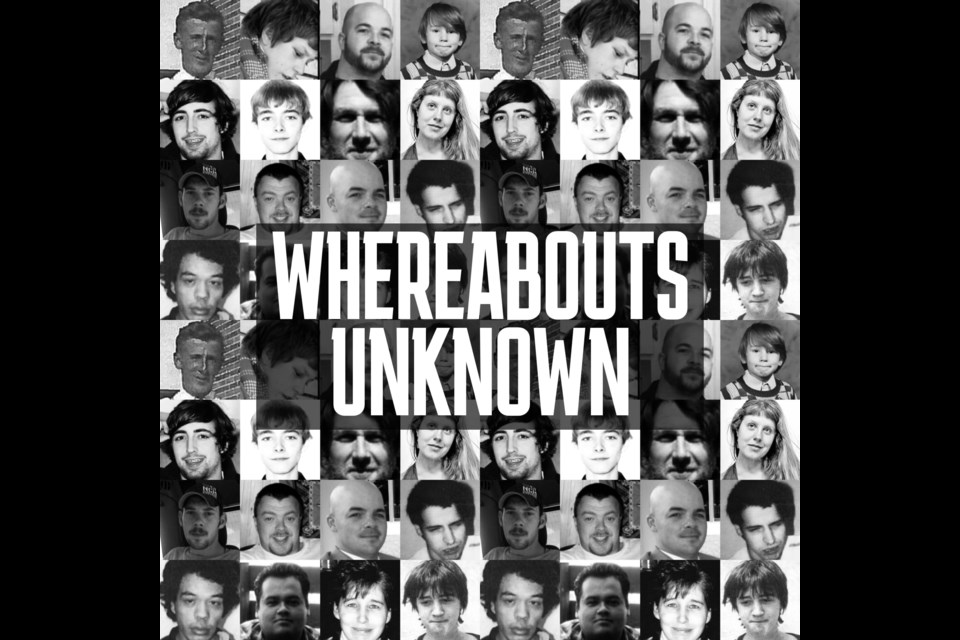Despite what your favourite episode of Law & Order makes you believe, most missing person cases are not resolved in 42 minutes plus commercials.
In fact, many cases often go unsolved decades — or not at all — which is why Barrie-based private investigator Ellen White decided to step in and try to help.
Along with a team of volunteer private Investigators, retired police detectives, researchers, cyber security and digital media specialists, White launched Whereabouts Unknown just over a year ago to assist families of the missing in bringing attention and awareness to their cases across Canada and the United States.
To date, the team has worked on 16 cases, and through a bi-weekly podcast — as well as their social media pages — share stories of missing persons cold cases with the hope that someone listening may have a tip that could help.
White, who has been a private investigator since the mid-1980s, says her desire to help stems back to the early days of her career, when she would be approached by families wanting her to work on their missing-person cases.
“It is very expensive and virtually all families could not afford it,” she tells BarrieToday. “I felt very bad about that back in the day and always wanted to be able to do this on a volunteer basis for these families.
“During COVID, things were quiet, so we decided to put together Whereabouts Unknown and to really harness social media and the power of the podcast to bring attention to old missing-person cold cases," White says.
Families typically approach them after they have exhausted all their options and are desperate for help, she says, adding there's never any cost to families and investigators cover their own expenses.
The team is currently working on its 16th case since launching the podcast last year, says White, adding the method they’re using has definitely been successful.
“We are getting a lot of tips on these cold cases,” she says, pointing to a recent cold-case investigation that hadn’t seen any new information in several decades as merely one example. “Now there are three investigators working on it and it’s been turned over to major crimes.
"We’ve been able to turn over a lot of new information, which is our intent. It’s certainly not to replace the police in any way. They do an absolutely amazing job on these cases, but their time and resources are spread very thin,” White says. “We are able to look at these cases with fresh eyes.”
Prior to recording her first podcast, White admits she had never even listened to one and has no desire to become a media personality or professional podcaster.
“I honestly had never listened to a podcast before doing my first one, and that might be pretty obvious, but we thought it could be a way to reach people,” she says. “The podcast is just a vehicle to get those tips and advance an investigation.”
They've found people from all over the world are responding to it, and hit No. 66 in North America back in the spring after the episode aired sharing the details on the disappearance of Danny Gaulton, who was last seen in Grande Prairie, Alta., on Nov. 24, 1997.
“We get fan mail from all over the world and we are so appreciative of that because every single country around the world has this issue of missing people," White says. "There isn’t anywhere it doesn’t happen.”
According to the RCMP, between 70,000 and 80,000 people are reported missing to police in Canada in any given year, so it’s no wonder White and her team are kept so busy.
“We feel bad that we have to turn people away, but at one point this summer we hit the point where we were approached by 20 families in a single day. We get requests every single day and we are never going to have the bandwidth to get to all of them,” she says regretfully.
“We do look at cases (where) we think we can shine a light on any social justice issues. We have covered addictions, domestic violence, in one we covered the impact of residential schools and how that has contributed to missing Indigenous men and women in the country. We try to get people thinking in our cases.”
Other important factors to consider before taking on any new case, she says, is timeliness and family engagement.
“While we may agree it’s a fascinating case, maybe there are no survivors, no family buy-in… so we look for that, and we focus on where we can do the most good and where the family is asking for help,” she says.
Given the nature of the cases they work on, White says they choose to measure their success on whether or not they were able to find new information that will ultimately give a conclusion of some type.
“Have we been able to find people? Yes. Last year, a family approached us on a fairly new case… and we were able to locate them in 12 hours. Obviously, fresher cases are a bit simpler to do,” she says. “Have we been able to identify what we fully believe happened to a person and the cause of their disappearance or death? Yes, we have been able to do that in the cases we’ve worked on… certainly not all… and honestly some will never be resolved, but in some we’ve been very fortunate about the podcast and our social-media efforts bringing in those tips.
“Cold cases don’t generally end well. We may be able to get some closure and some information, and we may be able to get a body site, but very rarely on a cold case will we be reuniting a live loved one with their family.”



